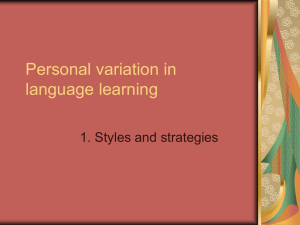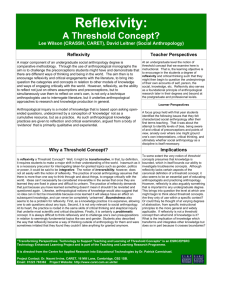Reflections on Reflexivity: Sociological Issues and Perspectives
advertisement
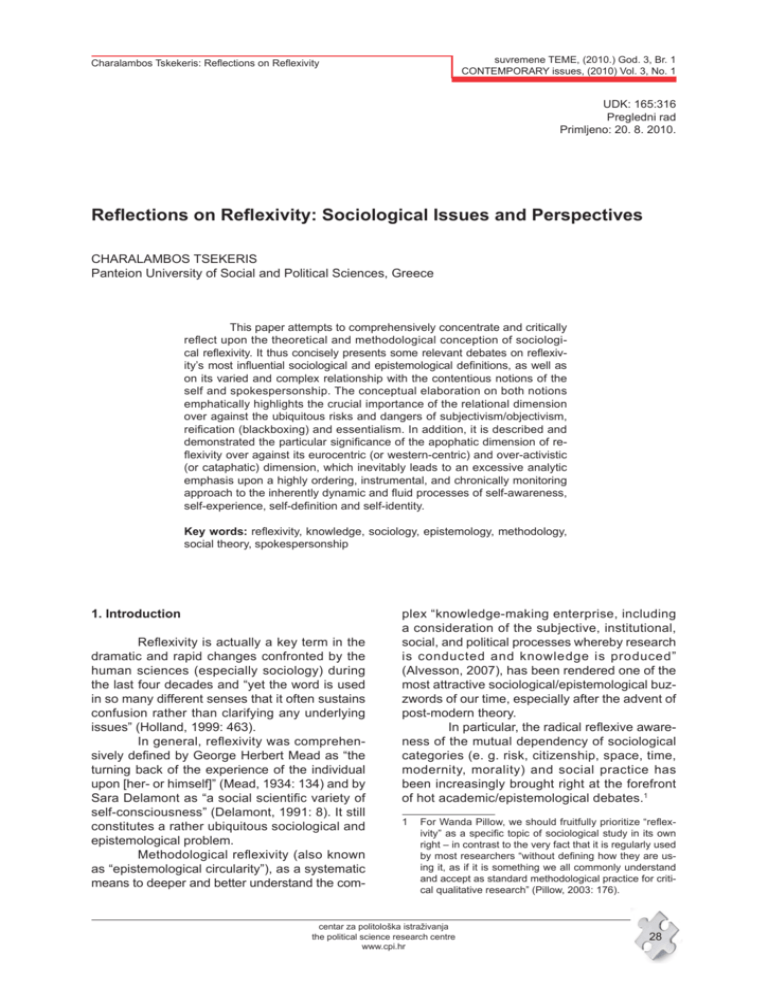
suvremene TEME, (2010.) God. 3, Br. 1 CONTEMPORARY issues, (2010) Vol. 3, No. 1 Charalambos Tskekeris: Reflections on Reflexivity UDK: 165:316 Pregledni rad Primljeno: 20. 8. 2010. Reflections on Reflexivity: Sociological Issues and Perspectives CHARALAMBOS TSEKERIS Panteion University of Social and Political Sciences, Greece This paper attempts to comprehensively concentrate and critically reflect upon the theoretical and methodological conception of sociological reflexivity. It thus concisely presents some relevant debates on reflexivity’s most influential sociological and epistemological definitions, as well as on its varied and complex relationship with the contentious notions of the self and spokespersonship. The conceptual elaboration on both notions emphatically highlights the crucial importance of the relational dimension over against the ubiquitous risks and dangers of subjectivism/objectivism, reification (blackboxing) and essentialism. In addition, it is described and demonstrated the particular significance of the apophatic dimension of reflexivity over against its eurocentric (or western-centric) and over-activistic (or cataphatic) dimension, which inevitably leads to an excessive analytic emphasis upon a highly ordering, instrumental, and chronically monitoring approach to the inherently dynamic and fluid processes of self-awareness, self-experience, self-definition and self-identity. Key words: reflexivity, knowledge, sociology, epistemology, methodology, social theory, spokespersonship 1. Introduction Reflexivity is actually a key term in the dramatic and rapid changes confronted by the human sciences (especially sociology) during the last four decades and “yet the word is used in so many different senses that it often sustains confusion rather than clarifying any underlying issues” (Holland, 1999: 463). In general, reflexivity was comprehensively defined by George Herbert Mead as “the turning back of the experience of the individual upon [her- or himself]” (Mead, 1934: 134) and by Sara Delamont as “a social scientific variety of self-consciousness” (Delamont, 1991: 8). It still constitutes a rather ubiquitous sociological and epistemological problem. Methodological reflexivity (also known as “epistemological circularity”), as a systematic means to deeper and better understand the com- plex “knowledge-making enterprise, including a consideration of the subjective, institutional, social, and political processes whereby research is conducted and knowledge is produced” (Alvesson, 2007), has been rendered one of the most attractive sociological/epistemological buzzwords of our time, especially after the advent of post-modern theory. In particular, the radical reflexive awareness of the mutual dependency of sociological categories (e. g. risk, citizenship, space, time, modernity, morality) and social practice has been increasingly brought right at the forefront of hot academic/epistemological debates.1 1 For Wanda Pillow, we should fruitfully prioritize “reflexivity” as a specific topic of sociological study in its own right – in contrast to the very fact that it is regularly used by most researchers “without defining how they are using it, as if it is something we all commonly understand and accept as standard methodological practice for critical qualitative research” (Pillow, 2003: 176). centar za politološka istraživanja the political science research centre www.cpi.hr 28 suvremene TEME, (2010.) God. 3, Br. 1 CONTEMPORARY issues, (2010) Vol. 3, No. 1 Charalambos Tskekeris: Reflections on Reflexivity The radical anti-objectivistic (value-loaded) conception of reflexivity entails that the customary sociological endeavor to systematically “position” individuals and various social or cultural groups and elites in terms of locus of control and power, or to methodologically “explicate” social or cultural representations of human rights, duties, justice, equality, democracy, security or terrorism, is de facto both politically and personally relevant. The social scientific researcher (the social psychologist, the social historian, the cultural anthropologist, the social or political analyst), as a historically located social agent, should always “state his/her attitude to the subject under discussion to let the readers know of the alternative position as well as to facilitate their better understanding of the situation” so that “it is no longer possible for the scientist to assume the classical so-called God’s eye view” (Dobronravova, 2009: 25). In the contemporary academic context, it is almost customary to variously describe sociological theories as both constitutive of and constitutive for practice, but also to tactically (or “cynically”, as the French critical sociologist and philosopher Pierre Bourdieu smartly puts it) use “reflexivity” in order to criticize or polemize others: “As the charge was once made of being a positivist, to be called an unreflexive practitioner seems to signify someone who is inadequate, incomplete and worst of all, outdated” (May, 1999: para 1.1).2 ercise of the mental ability, shared by all normal people, to consider themselves in relation to their (social) contexts and vice versa” (Archer, 2007: 4). The sociological theorization of this “complex dialogical interaction” heavily draws from the famous school of American Pragmatism (mainly grounded on the original stimulating insights of John Dewey, William James, Charles Sanders Peirce and George Herbert Mead).3 From a relational social epistemological analytic standpoint, the self (including the epistemological/philosophical or sociological self) is rather reflexively re-created; it is necessarily intertwined with the “real world” and dialectically re-constituted by the on-going, mutual, synergetic and (chaotic) self-organizing interaction of the ego (1) with the emergent social structures and (2) with the significant others (actual, imagined, or implied).4 The very existence (or appearance) of these “significant others” is completely integral to the evolutionary reflexive emergence of selfhood. Yet, in the original social interpretivist sense of George Herbert Mead, the “other” is not only the other (significant) person, “but another perspective: another way in which the world is judged or appreciated” (Natanson 1956: 64). The self thus appears neither as a mere “object” of knowledge, nor as an empirical ego, which somehow lacks autonomy, agency, imagination, choice, creativity, improvisation and spontaneity. In other words, the human subject is not passive, self-assured, atomistic, and narcissistically private any more (see e.g. Tsivacou, 2005; Cilliers 2. Reflexivity and the Self Reflexivity also involves the inspiring novel conception of “internal conversation” (Archer, 2003) that theoretically describes the continuous self-confrontation of the individual, as well as its complex dialogical interaction with the (changing) social environment. It is therefore “the regular ex2 As Mark Hobart puts it, “one person’s claim to knowledge is all too often another’s condemnation to ignorance” (Hobart, 1995: 51). In consequence, reflexivity is paradoxically transformed into an unethical egoistic project of simply becoming the “certified deconstructors” (Jackson, 1992) of other people’s discourse and a “dead end rather than a route to more thoughtful and interesting social studies” (Alvesson, 2007). This should lead us to further elaborate on the agonistic notion of “reflexive sociology” or, more precisely, on the antagonistic relationship between reflexive sociology and the sociology of reflexivity (Kenway and McLeod, 2004), between truly “reflexive accounts” and mere “accounts of reflexivity” (Mauthner and Doucet, 2003). In fact, reflexivity is a contingent chance rather than a “sacred cow”, a fixed or “black-boxed” model providing strong, irrefutable and eternal methodological guarantees (see Garratt, 2003). 3 According to Margaret Archer, “only if the ‘internal conversation’ can be upheld as an irreducible personal property, which is real and causally influential, can the exercise of its powers be considered as the missing mediatory mechanism that is needed to complete an adequate account of social conditioning” (Archer, 2003: 16). 4 In parallel, what should also be reflexively recognized is the particular importance of the “I-thou” relationship (Buber, 1970), which was the very essence of the great Socratic dialogues. This complex relationship has been involved with the original introduction of second-person inter-subjective methodologies, such as Bohmian dialogue, leading to innovative forms of “dialogic consciousness” (Bohm, 1985). centar za politološka istraživanja the political science research centre www.cpi.hr 29 suvremene TEME, (2010.) God. 3, Br. 1 CONTEMPORARY issues, (2010) Vol. 3, No. 1 Charalambos Tskekeris: Reflections on Reflexivity and De Villiers, 2000; Briggs and Peat, 1999).5 The self-in-relation-with-others (methodological relationalism) is now clearly prevailing upon the old self-in-social-vacuum (methodological individualism) (Ho et al., 2001). Instead of naively seeing subjectivity as an isolated, independent, self-contained and self-referred locus of individual experience (according to the classical Cartesian ego), the synthetic reflexive-relational logic, in the open spirit of Ludwig Binswanger (1963), fruitfully links it with objectivity and inter-subjectivity, through an (endless) uncertain circular-dialectical process, without however reducing ontological questions to epistemological ones (just as Kant did), or “facts” to performative descriptions and interpretations, symbolic categories and conceptual frameworks. Within a relational-realist or reflexiverealist6 analytic framework, knowledge cannot and should not be erroneously confounded with the “recording and analysis of the ‘pre-notions’ (in Durkheim’s sense) that social agents engage in the construction of social reality; it must also encompass the social conditions of the production of these pre-constructions and of the social agents who produce them” (Bourdieu, 2003: 282).7 5 Of course, it is almost a commonplace nowadays that the self is relational. In addition, it is almost a truism that knowledge cannot be analytically distinguished from its multiple complex cognitive-political practices, as well as from the multiple complex social relations that make it generally acceptable and legitimate. However, many of the so-called “situated” or “contextual” perspectives “still treat the environment as supplemental to the individual consciousness” and the “concept of autonomous individual mind – learning to participate – remains privileged and fundamentally unchallenged” (Fenwick, 2001: 247). This implicitly reflects the continuing determination of social/sociological theory to be strong, on the varied basis of final analytic judgments, robust results, compelling arguments and inescapably powerful conclusions (Pels, 2003). It is remarkable that hardly anyone in everyday performative practice actually sees knowledge as inherently circular! See e.g. Pels, 2002 and Woolgar, 1988. 6 For the notion of reflexive or circular realism, see Pels, 2000b. 7 Of course, this should carefully refrain from any sort of “last-instance” objectivism and decisively move towards a rather never-ending reflexive dialectic between micro and macro, action and structure, transformation and reproduction, individuality and sociality (or individual and collective action), randomness and simplicity, contingency and directionality, emergence and social causation (Sawyer, 2007), as well as towards a generalized critique of naïve/uncritical/unreflexive realism, reification and essentialism, at the level of both everyday world-making and professional scientific (sociological/organizational) analysis. This is of course in line with Roy Bhaskar’s or Pierre Bourdieu’s stance of critical/relational realism, but not with Anthony Giddens’s ultra-activistic structuration theory, or with Berger/Luckmann’s subjectivistic accounts of social constructivism, which implicitly reproduce and naively celebrate the old tradition of phenomenological individualism. 3. Reflexivity and Spokespersonship But, in the analytic context of a truly reflexive theory, the eye of the “observer” (Luhmann, 1995; Maturana and Varela, 1987; Tsivacou, 2005; Dobronravova, 2009) is always there. The very fact that these “social conditions” (or the “generative mechanisms”) are only observable through their consequences raises the reflexive problem of their representation. That is, how do we know that invisible conditions, mechanisms, figurations or structures really exist? Who speaks for them (or in their name)? And who has accorded the essential primacy of the invisible (unobservable) over the visible (observable)? Such self-critical questions about the representation (delegation) of “noumenal” or “transfactual” entities, as well as about the crucial performative role of their (intellectual) “spokespersons”,8 potentially give us valuable access to a genuine reflexive (meta-reflexive) sociology of sociologists, intellectuals and experts (see Pels, 2000a). Interrogating the intriguing phenomenon of “spokespersonship” itself, in particular, implies a whole reflexive knowledge-political project of carefully bringing the observer back into her/his observation, the narrator back into her/his narrative, or the scenographer back into her/his scene (Gouldner, 1985), as well as of taking seriously into account the complex “crucial role of the definer” (Alpert, 1961: 114), which is in direct contrast to “traditional” or “received” positivistic tendencies to hypostasize social reality and to reify (or to blackbox) supposedly impersonal “social facts” (Durkheim, 1982). 8 Spokespersonship involves the ubiquitous, communication-dependent representational work of publicly performing, evoking, or making visible and available that which is absent and therefore falls outside the horizon of immediate control, which is not able to speak for itself (people, animals, things, facts, mechanisms, or relations). This is, by definition, a “vitally constitutive element of all cultural life, since collectivities cannot subsist and expand other than by mobilizing absent realities, events or processes … in networks of interaction that stretch into distant reaches of time and space” (Pels, 2000a: 1). centar za politološka istraživanja the political science research centre www.cpi.hr 30 suvremene TEME, (2010.) God. 3, Br. 1 CONTEMPORARY issues, (2010) Vol. 3, No. 1 Charalambos Tskekeris: Reflections on Reflexivity Against any implicit form of epistemological realism or essentialism, according to which social structures, systems, figurations or fields are authoritatively described as “objectively” factual, self-contained and autonomous entities (and not as emergent theoretical constructions proposed by the sociological observer), the antireificatory notion of “spokespersonship” strongly refuses to uphold any sharp and static distinction, or any privileged distance, between representation and reality, between words and the very “flesh of the world” (Merleau-Ponty, 1962). Instead, it rather tends to conceive of social objects primarily as meaningful, complex and dynamic virtual realities, which are incessantly and unpredictably realized and de-realized, instituted and de-instituted, through contextual and situated definitions and performances, both on the level of routine everyday action and on the second-order level of professional sociological observation and analysis (see Pels, 2003). The complex projective relationship between the spokesperson and that which is spoken for has been highly problematized and overwhelmingly characterized as both performative and circular (see Tsekeris and Katerelos, 2007): 1. On the one hand, the silent performative effectiveness of scientific or political statements derives “naturally” from the relative “capacity of spokespersons or ‘authorities’ to enforce collective recognition and hence to realize their representations with the aid of an accredited and therefore credible language” (Pels, 2002: 77). Any scholarly description of society can eventually “produce significant changes within society once this description reaches a certain level of acceptance. To have any influence on the practical job of modifying self-descriptions, theories must be able to gain recognition and circulation outside narrow intellectual circles. Then it becomes a description of society within society, and thereby changes society (the names of Marx, Kant and Freud may suffice to prove this point)” (Laermans and Verschraegen, 1998: 128). This ultimately calls for the explicit celebration of the so-called “theory effect” of the sociological discursive construction of reality (Bourdieu, 1991), which is often underestimated and erased (or just methodologically neutralized).9 2. On the other hand, a critical theory of spokespersonship needs to openly acknowledge the complex “intricate circular transmission of legitimacy and power from the group to its representer, in the course of which the group apparently creates the person who speaks in its place …, whereas in reality it is just as true to say that it is the spokesperson who creates the group” (Pels, 2000a: 8). The essential complex circularity of connection between the signifier and the signified, the representer and the represented, does not, however, exclude a minimal critical difference or hiatus (or tension) between them, in order to actually preserve the vital interactional space in which both laypersons (citizens) and professional politicians or experts are able to mutually and synergistically play their distinctive parts (see Ankersmit, 1994). In the daily life-worldly context of their various collective experiments and research findings, working scientists continuously and creatively add up new spokespersons representing non-humans and their needs (e.g. the Gulf Stream, which allegedly threatens to disappear due to multiple changes in the salinity of the Atlantic Ocean) to “the many spokespersons 9 Performativity is generally defined as a useful mode of theorizing and practicing the multiple ways in which social reality comes into being. It lies in the widely accepted (post-structuralist) linguistic emphasis on meaning and the well-known “social constructionist” premise that acquiring knowledge (or truth) does not involve an accurate mimetic reflection (re-presentation) of the world, but is associated with a relationally embedded human activity, which substantially alters the contingent and fragile “nature” of reality itself. Knowledge is subsequently the uncertain (and unpredictable) product of the individual’s relationships, in communication with others in the fluid and precariously negotiated world. As ethnomethodologists might simply put it, to describe a situation is to constitute it. Therefore, all social scientific statements, propositions and theories are performative, in the clear-cut sense that they have effects, they do things, and they make differences. Accordingly, for John Law and John Urry (2004), research methods in the social sciences do not simply describe or explain the world as it is, but also contingently enact it, in a wide range of locations. They actually help to bring into being what they also discover and they coproduce the objects they are supposed to objectively analyze. That is, the making of what we know in-here goes hand in hand with the making of what there is out-there. The idea of performative reality-making, partially inspired by Austinian speech act theory, the Thomas/Merton theorem of the self-fulfilling prophecy, dramaturgical metaphors (Goffman, Searle, Turner, Schechner, and Schieffelin) and the poststructuralist inseparability of factual and value judgments in performative speech, strongly emphasizes the communicative powers of social research and the “natural” involvement of an “audience” (e.g., peers, students, readers, a physical audience or a cyber audience). centar za politološka istraživanja the political science research centre www.cpi.hr 31 suvremene TEME, (2010.) God. 3, Br. 1 CONTEMPORARY issues, (2010) Vol. 3, No. 1 Charalambos Tskekeris: Reflections on Reflexivity who already represent humans and their needs …Who would have anticipated that human progress would have become so all-embracing?” (Latour, 1998: 209). This profoundly signifies a durable, heterogeneous and complex society of both humans and non-humans. A critical theory of spokespersonship should thus aim to fruitfully identify us as reflexive authors, who self-consciously take ethical responsibility for what we (playfully) enact. Such a theory rather favours an alternative, nonascetic social epistemological approach, which self-confidently stands against all purist macho aspirations to Platonic perfectionism, intellectual ventriloquism, and priestly hypocrisy (Nietzsche, 1996; Bourdieu, 1991). The issue here involves a novel socialepistemological sense of performative sensitivity, complex relationality, intellectual courage and democratic imagination, as well as an incessant radical critique of the hegemonic power over representation, so as to allow the represented “to talk back and to include an ever wider constituency in our audience which is counterfactually identical with the universal audience (the dead included)” (Vandenberghe, 2002: 63). From a relational-realist, or reflexive-realist, analytic viewpoint, the radical constructivists (a la Woolgar) should nevertheless abandon their extreme ontological nihilism10 and make only methodological use of such notions as relativism, constructivism, performativity, and reflexivity/ spokespersonship (without however ending up to any kind of methodological foundationalism). This will eventually show us “how ‘reality’ – that is, the descriptions, re-descriptions, and constructions of reality, but not reality itself, of course, which exists independently of those descriptions in the same way as the dog barks whether we have a concept of it or not – is ‘performatively’ constructed as a matter of course by their spokespersons. Such a move from ontological to methodological nominalism implies a 10 The highly heterogeneous nexus of post-structuralism, post-modernism, deconstruction, psychoanalysis, feminism, gender and queer studies, archeology/genealogy and other de-constructivist approaches, such as Rorty´s neo-pragmatism, usually does not recognize anything “outside of the text” (Derrida) and has more or less tended to impede or delete the critical impetus of hermeneutics. It often commits the so-called “linguistic fallacy”, or the “reification of language”, which naively reduces the world to language (just as Rorty did), social action to “performance”, and the human subject to an unstable patchwork of signifiers (the case of Baudrillard) or to an endless chain discursive identifications, and has unavoidably led to a serious underestimation of the causal power of language. consequent switch from a ‘deconstructivist’ to a genuinely ‘constructivist’ posture, from construction to something more akin to phenomenological constitution” (Vandenberghe, 1999: 35, n. 7). 4. The Apophatic Dimension of Reflexivity Furthermore, it is quite remarkable that various forms of reflexivity are paradoxically attracted to the old Cartesian ideals of mentalism, authoritarian individualism, elitism and contexttranscendent (yet racialized) knowledge (see Tsekeris and Katrivesis, 2008). However, genuine reflexive thinking is significantly compatible to novel sociological/philosophical approaches beyond old occidentalist/eurocentric agendas, as well as to the creative quest for spirituality (see e.g. Briggs and Peat, 1999). Apophatic reflexivity, a term coined within social/sociological theory by the leading Greek sociologist and prolific writer Nicos Mouzelis (1999),11 signifies a wholly different (non-eurocentric/non-occidentalist), less rational and more spiritual way of theorizing the fluid processes of self-awareness, self-experience and self-identity, within the current “liquid” framework of postmodernity. It more generally refers to possible ways in which spirituality can substantially contribute to current academic debates regarding the complex internal conversations of the social subject, as well as regarding the emerging shift toward post-secular and post-materialist codes and values. The innovative concept of apophatic reflexivity is explicitly opposed to Anthony Giddens’s well-established theory of reflexive modernization (see Giddens, 1991), at the level of the social individual. In particular, Mouzelis argues that Giddens’s notion of (individual) reflexivity is both eurocentric (or “western-centric”) and “overactivistic” (or “cataphatic”), inevitably leading to an excessive analytic emphasis upon a highly ordering, instrumental, and chronically monitoring approach to the inherently varied, complex and dynamic process of self-definition and selfidentity (see Mouzelis, 1999: 85-86). Hence, apophatic reflexivity can be deemed as an elaborate and systematic way to comprehensively challenge and extend “received” or “conventional” conceptions of reflexivity, as well 11 For Nicos Mouzelis’s most recent account on the utility of the apophatic/cataphatic distinction in the sociological/social theoretical study of self–self (intra-active) and self–other (interactive) forms of reflexivity, see Mouzelis, 2010. centar za politološka istraživanja the political science research centre www.cpi.hr 32 suvremene TEME, (2010.) God. 3, Br. 1 CONTEMPORARY issues, (2010) Vol. 3, No. 1 Charalambos Tskekeris: Reflections on Reflexivity as to perceptively escape from severe limitations on the possible modes of individual reflexive responses to contemporary post-traditional and postmodern settings. Mouzelis sharply criticizes Giddens’s theoretical framework, where knowledgeable social actors are more or less depicted as constantly involved in coldly cognitive “means-ends situations, constantly trying reflexively and rationally to choose their broad goals as well as the means of their realisation”, exactly because it naively neglects “more contemplative, more ‘easy-going’, less cognitive ways of navigating reflexively in a world full of choices and individual challenges” (Mouzelis, 1999: 85). Apophatic reflexivity is thus focusing on the increasing (existentialist) importance of “the inner life”, or the increasing necessity to create one’s own goals (or to construct one’s own biography) through the on-going silent negation (apophasis) of the various internal obstacles to the genuine “search for a spiritual, meaningful existence” (Mouzelis, 1999: 88). This radical approach freely allows for broad life orientations, projects, agendas and goals to spontaneously emerge, rather than being strictly dictated by “Promethean” planning, coldly cognitive factors, rational calculations, “divine revelations, sacred texts, as well as rationalistically derived moral codes” (Mouzelis, 1999: 88). In this original analytic context, apophatic reflexivity comes up in the very same line with the apophatic theology (or “theology by way of negation”) of the eastern Orthodox church, where the believer turns inward in order to eliminate obscuring thoughts and/or practices, as well as with the Freudian psychoanalytic tradition, where the central aim of analysis is “not to impose on or offer the analysand pre-set goals, but rather to ‘negatively’ eliminate or weaken various defensive mechanisms that are obstructing the emergence of a person’s ‘genuine’ goals” (Mouzelis, 2007: para 2.10).12 Apophatic reflexivity is also in the very same vein with spiritual traditions, such as the philosophical sociology/anthropology of Martin Buber (1970) and the philosophy of the renowned anti-religious writer and speaker Jiddu Krishnamurti, who repeatedly argued that “the 12 In a different analytic framework, Nicos Mouzelis supports the (weak) “apophatic” character of technology (particularly manifested in contemporary environmental recycling and anti-pollution technologies), which is profoundly linked to the modest and humble goals of restoring natural balances and harmonies, as well as to the SelfNature relationship, against the Western classical power discourse (Mouzelis, 1997). fundamental understanding of oneself does not come through knowledge or through the cultivation of experiences” (Krishnamurti, 1970: 25). For Krishnamurti, indeed, an “authentic” existence implies self-exploration, self-awareness and self-development through “silent and continuous gazing inwards” (Mouzelis, 1999: 89), as well as a “tranquility that is not a product of the mind, a tranquility that is neither imagined nor cultivated” (Krishnamurti, 1970: 28). Such an extended “post-colonial” and “post-secular” conception of reflexivity potentially offers not only a creative and dynamic widening of selfidentity and the communication with the self, but also a provocative global redefinition of the very human experience given that “being human involves feeling, dreaming, experiencing, remembering and forgetting, and not simply knowing” (Halton, 1995: 273). Nevertheless, alternative interdisciplinary arguments, views and discourses “may further illustrate and problematize the one-sidedness of neo-liberal accounts of the reflexive self” (Adams, 2002), since apophatic reflexivity does not actually “attempt to do justice to the entirety of critical points levelled at the term. In pursuing these alternatives, a more complex and representative understanding of reflexivity and selfidentity may be generated” (Adams, 2007: 60). 5. Final Thoughts and Considerations What perhaps remains to be carefully explored and elaborated here is the possible circular-reflexive application of apophatic reflexivity on the epistemic subject itself, toward a genuine apophatic reflexive sociology (Tsekeris and Lydaki, 2007),13 as well as its wider normative/ ethical connotations. Our analytic attention must then turn into the much neglected (and unrestored) significance of normative/ethical issues, from a fertile interdisciplinary/transdisciplinary theoretical viewpoint. Normative notions of reflexive agency and ethical responsibility do remain extremely important, but they have to be adequately supplemented with fresh insights from emerging theories of social complexity, (chaotic) self-organization and social construction (Cilliers and De Villiers, 2000). There are of course many unresolved (or unaddressed) issues in this huge area and some 13 Reflexivity must therefore be introverted and extroverted at the same time. For the relevant notion of “structural self-reflexivity” (somehow similar to the Bourdieusian intellectual socioanalysis, or “self-socioanalysis”), see the superb analysis of Hans Herbert Koegler (1997). centar za politološka istraživanja the political science research centre www.cpi.hr 33 Charalambos Tskekeris: Reflections on Reflexivity suvremene TEME, (2010.) God. 3, Br. 1 CONTEMPORARY issues, (2010) Vol. 3, No. 1 very exciting intellectual work could be collaboratively done here. Embracing the relational “normative dimension”, within the sociological reflexivity discourse, could perhaps help us in seeing ourselves “with the eyes of the other” (Heinz von Foerster), as well as in moving beyond the Enlightenment need for grand intellectual heroes, or compassionate social engineers (designing unflawed systems), and the utopian/narcissistic modernist dreams (delusions) of unlimited theoretical wisdom and epistemological perfection – without however devaluing science or eschewing issues of value, justice, politics and accountability. It could also help us to radically expand the famous “it could be otherwise” liberal-progressive vision (Charles W. Mills) of social thought, as well as to see “beyond the end of our noses” and seriously/responsibly assess the likelihood of (local) social change and emancipatory social scenarios, under the multiple restrains of the post-modern framework. In the very spiritual context of a new reflexive “sociological imagination” (Charles W. Mills), social theory can be openly re-transformed into a form of universal historical self-consciousness. Actually, this ideal is not dead yet! centar za politološka istraživanja the political science research centre www.cpi.hr 34 Charalambos Tskekeris: Reflections on Reflexivity suvremene TEME, (2010.) God. 3, Br. 1 CONTEMPORARY issues, (2010) Vol. 3, No. 1 References Adams, M. (2007): Self and Social Change, London: Sage Adams, M. (2002): Ambiguity: The Reflexive Self and Alternatives, M/C: A Journal of Media and Culture, 5(5) – URL= <http://www.media-culture.org.au/mc/0210/Adams.php> (accessed 13 August, 2010) Alpert, H. (1961): Emile Durkheim and His Sociology, New York: Columbia University Press Alvesson, M. (2007): Reflexivity, in: Ritzer, G. (ed.): Blackwell Encyclopedia of Sociology, London: Blackwell Reference Online (accessed 13 August, 2010) Ankersmit, K. (1994): History and Tropology, Berkeley: University of California Press Archer, M. (2007): Making our Way through the World: Human Reflexivity and Social Mobility, Cambridge: Cambridge University Press Archer, M. (2003): Structure, agency and internal conversation, Cambridge: Cambridge University Press Binswanger, L. (1963): Being-in-the-world: Selected papers of Ludwig Binswanger, New York: Harper & Row Bohm, D. (1985): Unfolding meaning: A weekend of dialogue, London: Routledge Bourdieu, P. (2003): Participant Objectivation, J. Roy. anthrop. Inst., 9: 281-294 Bourdieu, P. (1991): Language and Symbolic Power, Cambridge: Polity Press Briggs, J. and Peat, D. (1999): Seven Life Lessons of Chaos: Timeless Wisdom from the Science of Change, New York: Harper Collins Buber, M. (1970): I and thou, New York: Simon & Schuster Cilliers, P. and De Villiers, T. (2000): The Complex “I”, in: Wheeler, W. (ed.): The Political Subject, London: Lawrence & Wishart Delamont, S. (1991): Fieldwork in Educational Settings: Methods, Pitfalls and Perspectives, London: Falmer Press Dobronravova, I. (2009): The True Democracy and the True Self-Organization, tripleC - Cognition, Communication, Co-operation: Open Access Journal for a Global Sustainable Information Society, 7 (1): 25-28 Durkheim, E. (1982/1895): The Rules of Sociological Method, London: Macmillan Fenwick, T. (2001): Work knowing on the fly: Post-corporate enterprise cultures and co-emergent epistemology, Studies in Continuing Education, 23 (1): 243-259 Garratt, D. (2003): My qualitative research journey: Researching against the rules, Cresskill, NJ: Hampton Press Giddens, A. (1991): Modernity and Self-Identity: Self and Society in the Late Modern Age, Cambridge: Polity Press Gouldner, A. (1985): Against Fragmentation: The Origins of Marxism and the Sociology of Intellectuals, New York: Oxford University Press Halton, E. (1995): The Modern Error: Or, the Unbearable Enlightenment of Being, in: Featherstone, M., Lash, S. and Robertson, R. (eds): Global Modernities, London: Sage Ho, D. Y., Chan, S. F. and Zhang, Z. X. (2001): Metarelational analysis: An answer to What’s Asian about Asian social psychology?, Journal of Psychology in Chinese Societies, 2 (1): 7-26 Hobart, M. (1995): As I Lay Laughing: Encountering Global Knowledge in Bali, in: Fardon, R. (ed.), Counterworks: Managing the Diversity of Knowledge, London: Routledge Holland, R. (1999): Reflexivity, Human Relations, 52(4): 463-484 Jackson, S. (1992): The amazing deconstructing woman, Trouble and Strife, 25: 25-31 Kenway, J. and McLeod, J. (2004): Bourdieu’s reflexive sociology and spaces of points of view, British Journal of Sociology of Education, 25(4): 525-544 Koegler, H. H. (1997): Reconceptualizing Reflexive Sociology, Social Epistemology, 11 (2): 223-50 Krishnamurti, J. (1970): The Krishnamurti Reader, London: Arkana Laermans, R. and Verschraegen, G. (1998): Will a sociological communication ever be able to influence social communication?, Ethical Perspectives, 5 (2): 127-132 Latour, B. (1998): From the world of science to the world of research?, Science, 280 (5361): 208-209 Law, J. and Urry, J. (2004): Enacting the social, Economy and Society, 33 (3): 390-410 Luhmann, N. (1995): Social Systems, Stanford: Stanford University Press Maturana, H. and Varela, F. (1987): The tree of knowledge: The biological roots of human understanding, Boston: Shambhala Press centar za politološka istraživanja the political science research centre www.cpi.hr 35 Charalambos Tskekeris: Reflections on Reflexivity suvremene TEME, (2010.) God. 3, Br. 1 CONTEMPORARY issues, (2010) Vol. 3, No. 1 Mauthner, N., Doucet, A. (2003): Reflexive accounts and accounts of reflexivity in qualitative data analysis, Sociology, 37 (3): 413-431 May, T. (1999): Reflexivity and Sociological Practice, Sociological Research Online, 4 (3) – URL= <http:// www.socresonline.org.uk/4/3/may.html> (accessed 13 August, 2010) Mead, G. H. (1934): Mind, Self and Society (edited by C. W. Morris), Chicago: University of Chicago Press Merleau-Ponty, M. (1962): Phenomenology of perception, New York: Humanities Press Mouzelis, N. (2010): Self and Self-Other Reflexivity: The Apophatic Dimension, European Journal of Social Theory, 13 (2): 271-284 Mouzelis, N. (2007): Habitus and Reflexivity: Restructuring Bourdieu’s Theory of Practice, Sociological Research Online, 12 (6) – URL= <http://www.socresonline.org.uk/12/6/9.html> (accessed 13 August 2010) Mouzelis, N. (1999): Exploring post-traditional orders: Individual reflexivity, pure relations and duality of structure, in: O’Brien, M., Penna, S. and Hay, C. (eds): Theorising Modernity: Reflexivity, Environment and Identity in Giddens’ Social Theory, London and New York: Longman Mouzelis, N. (1997): Religious Neoliberalism, To Vima, 2 November 1997, p. B01. Natanson, M. (1956): The Social Dynamics of George H. Mead, Washington, DC: Public Affairs Press Nietzsche, F. (1996/1887): On the Genealogy of Morals, Oxford: Oxford University Press Pels, D. (2003): Unhastening Science: Autonomy and Reflexivity in the Social Theory of Knowledge, Liverpool: Liverpool University Press Pels, D. (2002): Everyday Essentialism. Social Inertia and the Münchhausen Effect, Theory, Culture & Society, 19 (5/6): 69-89 Pels, D. (2000a): The Intellectual as Stranger: Studies in Spokespersonship, London: Routledge Pels, D. (2000b): Reflexivity: One Step Up, Theory, Culture & Society, 17 (3): 1-25 Pillow, W. (2003): Confession, catharsis, or cure?, Qualitative studies in education, 16 (2): 175-196 Sawyer, K. (2007): Social Emergence: Societies as Complex Systems, New York: Cambridge University Press Tsekeris, C. and Lydaki, A. (2007): Apophatic Reflexivity, in: Ritzer, G. (ed.), Blackwell Encyclopedia of Sociology, London: Blackwell Reference Online (accessed 13 August, 2010). Tsekeris, C. and Katerelos, I. (2007): Spokespersonship, in: Ritzer, G. (ed.), Blackwell Encyclopedia of Sociology, London: Blackwell Reference Online (accessed 13 August, 2010). Tsekeris, C. and Katrivesis, N. (2008): Ethical Reflexivity and Epistemological Weakness, Tamara Journal for Critical Organization Inquiry, 7 (3): 26-34 Tsivacou, I. (2005): The Ideal of Autonomy from the Viewpoint of Functional Differentiation / Integration of Society, Systems Research and Behavioral Science, 22: 509-524 Vandenberghe, F. (2002): Reconstructing Humants: A Humanist Critique of Actant-Network Theory, Theory, Culture & Society, 19 (5/6): 51-67 Vandenberghe, F. (1999): The Real is Relational: An Inquiry into Pierre Bourdieu’s Constructivist Epistemology, Sociological Theory, 17(1): 32-67 Woolgar, S. (1988): Science: The Very Idea, London: Tavistock centar za politološka istraživanja the political science research centre www.cpi.hr 36 Charalambos Tskekeris: Reflections on Reflexivity suvremene TEME, (2010.) God. 3, Br. 1 CONTEMPORARY issues, (2010) Vol. 3, No. 1 Refleksije o refleksivnosti: Sociološka pitanja i perspektive CHARALAMBOS TSEKERIS Panteion Sveučilište društvenih i političkih znanosti, Grčka Cilj ovog rada je temeljito se usredotočiti i kritički se suočiti s teorijskom i metodološkom koncepcijom sociološke refleksivnosti. Članak potom daje pregled relevantnih rasprava o sociološkim i metodološkim definicijama refleksivnosti, kao i o kompleksnom odnosu prema pojmovima sebe i glasnogovorništva. Konceptualna elaboracija obaju pojmova naglašava ključnu važnost relacijske dimenzije nad rizicima i opasnostima subjektivizma/objektivizma, reifikacije (blackboxing) i esencijalizma. Također, posebna važnost dana je apofatičkoj dimenziji refleksivnosti, naspram eurocentrične (vestocentrične) i preaktivističke (ili katafatičke) dimenzije koja neizbježno vodu u pretjerano analitički naglasak na čvrstom uređenju, instrumentaliziranom i vremenski praćenom pristupu inherentno dinamičnim i fluidnim procesima samosvijesti, samoiskustva, samopoimanja i samoidentificiranja. Ključne riječi: refleksivnost, znanje, sociologija, epistemologija, metodologija, društvena teorija, glasnogovorništvo centar za politološka istraživanja the political science research centre www.cpi.hr 37
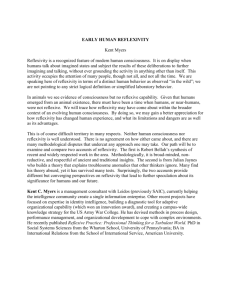
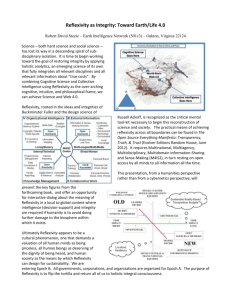
![Reflexivity in Academic Research [.PPT]](http://s2.studylib.net/store/data/005467615_1-5f1ed51efa2e2c6daa464b130d515ef6-300x300.png)
